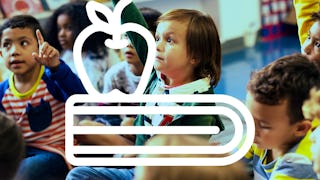Culture and language are inextricably linked. As teachers, we are often faced with the challenge of teaching both language and elements of culture to our English learners. When these students join our classes, they come equipped with knowledge about their own culture, which may or may not have the same norms and values as the new one they find themselves in. It is not our job, as teachers, to prove that one culture is better than another. Instead, it’s our goal to understand how culture influences one’s identity, affirm our students’ identities in the classroom, and use best practices to teach intercultural communicative competence and promote acceptance and respect for those who are different from us.

Genießen Sie unbegrenztes Wachstum mit einem Jahr Coursera Plus für 199 $ (regulär 399 $). Jetzt sparen.

The Role of Culture in Teaching English Learners
Dieser Kurs ist Teil von Spezialisierung für Introduction to Teaching English Learners


Dozenten: Alice Llanos
1.925 bereits angemeldet
Bei enthalten
(18 Bewertungen)
Empfohlene Erfahrung
Was Sie lernen werden
Discover new ideas for teaching and assessing cultural knowledge and intercultural communicative competence.
Learn how to incorporate culturally responsive teaching methods into your everyday classroom practices.
Understand the multi-dimensional nature of culture and its importance in teaching English learners.
Kompetenzen, die Sie erwerben
- Kategorie: Cultural Sensitivity
- Kategorie: Teaching
- Kategorie: Culture
- Kategorie: Instructing
- Kategorie: Diversity Awareness
- Kategorie: Intercultural Competence
- Kategorie: English Language
- Kategorie: Language Learning
- Kategorie: Curriculum Planning
- Kategorie: Lesson Planning
- Kategorie: Education and Training
- Kategorie: Cultural Diversity
- Kategorie: Mathematics Education
- Kategorie: Student Engagement
- Kategorie: Diversity Equity and Inclusion Initiatives
- Kategorie: Pedagogy
- Kategorie: Cultural Responsiveness
Wichtige Details

Zu Ihrem LinkedIn-Profil hinzufügen
Erfahren Sie, wie Mitarbeiter führender Unternehmen gefragte Kompetenzen erwerben.

Erweitern Sie Ihre Fachkenntnisse
- Lernen Sie neue Konzepte von Branchenexperten
- Gewinnen Sie ein Grundverständnis bestimmter Themen oder Tools
- Erwerben Sie berufsrelevante Kompetenzen durch praktische Projekte
- Erwerben Sie ein Berufszertifikat zur Vorlage

In diesem Kurs gibt es 4 Module
In Module 1, you will learn about the complex construct of culture and the various factors that influence it. We'll explore the concepts of personal, social, cultural, and linguistic identities and how we can affirm our students' identities in the classroom. You will be able to distinguish between the processes of enculturation and acculturation in order to better understand your English learners' perspectives of learning a new culture. We wrap up the module by reflecting on your own cultural background and the ways in which your life experiences and influences relate to your current points of view.
Das ist alles enthalten
6 Videos9 Lektüren3 Aufgaben1 peer review1 Diskussionsthema
Module 2 is all about becoming comfortable with culture, for both teachers and students. We'll become aware of possible implicit biases and power dynamics between teacher and students that may impact learning in the classroom. We'll introduce the concept of culture shock and discuss ways to help newcomer English learners adjust to their new learning environment. You will discover how asset-based pedagogy models, including Culturally Responsive Teaching (CRT), can foster academic success for English learners. We wrap up the module by evaluating curriculum for elements of culturally responsive teaching.
Das ist alles enthalten
6 Videos10 Lektüren3 Aufgaben1 peer review1 Diskussionsthema
In module 3, we will learn about the fundamental connection between culture and communication. You'll discover how culture affects language use and how language and thought are windows into cultural points of view. We introduce the crucial construct of intercultural communicative competence (ICC) and best practices to teach and assess it. You'll define a speech community and gain an understanding of the many speech communities your English learners have to navigate on a daily basis. We wrap up the module by evaluating a lesson for elements of ICC.
Das ist alles enthalten
6 Videos11 Lektüren3 Aufgaben1 peer review1 Diskussionsthema
The final module in the course aims to provide more practical tips for incorporating culture into the classroom across grade levels and subject areas. You will hear from experts about the various ways in which they have implemented culturally responsive teaching in math, STEM, art, and history. We'll review some traditional classroom activities for teaching about culture. You will gain insight into the best methods for and challenges of assessing cultural knowledge and ICC. We'll also highlight awareness of cultural biases in assessment and how to avoid them. The module wraps up with a lesson planning assignment in which you'll be asked to incorporate activities to teach ICC, cultural content knowledge, or implement culturally responsive teaching methods.
Das ist alles enthalten
6 Videos12 Lektüren3 Aufgaben1 peer review1 Diskussionsthema
Erwerben Sie ein Karrierezertifikat.
Fügen Sie dieses Zeugnis Ihrem LinkedIn-Profil, Lebenslauf oder CV hinzu. Teilen Sie sie in Social Media und in Ihrer Leistungsbeurteilung.
Mehr von Learning English entdecken
 Status: Kostenloser Testzeitraum
Status: Kostenloser TestzeitraumRice University
 Status: Kostenloser Testzeitraum
Status: Kostenloser TestzeitraumRice University
 Status: Kostenloser Testzeitraum
Status: Kostenloser TestzeitraumRice University
 Status: Kostenloser Testzeitraum
Status: Kostenloser TestzeitraumArizona State University
Warum entscheiden sich Menschen für Coursera für ihre Karriere?





Neue Karrieremöglichkeiten mit Coursera Plus
Unbegrenzter Zugang zu 10,000+ Weltklasse-Kursen, praktischen Projekten und berufsqualifizierenden Zertifikatsprogrammen - alles in Ihrem Abonnement enthalten
Bringen Sie Ihre Karriere mit einem Online-Abschluss voran.
Erwerben Sie einen Abschluss von erstklassigen Universitäten – 100 % online
Schließen Sie sich mehr als 3.400 Unternehmen in aller Welt an, die sich für Coursera for Business entschieden haben.
Schulen Sie Ihre Mitarbeiter*innen, um sich in der digitalen Wirtschaft zu behaupten.
Häufig gestellte Fragen
To access the course materials, assignments and to earn a Certificate, you will need to purchase the Certificate experience when you enroll in a course. You can try a Free Trial instead, or apply for Financial Aid. The course may offer 'Full Course, No Certificate' instead. This option lets you see all course materials, submit required assessments, and get a final grade. This also means that you will not be able to purchase a Certificate experience.
When you enroll in the course, you get access to all of the courses in the Specialization, and you earn a certificate when you complete the work. Your electronic Certificate will be added to your Accomplishments page - from there, you can print your Certificate or add it to your LinkedIn profile.
Yes. In select learning programs, you can apply for financial aid or a scholarship if you can’t afford the enrollment fee. If fin aid or scholarship is available for your learning program selection, you’ll find a link to apply on the description page.
Weitere Fragen
Finanzielle Unterstützung verfügbar,
¹ Einige Aufgaben in diesem Kurs werden mit AI bewertet. Für diese Aufgaben werden Ihre Daten in Übereinstimmung mit Datenschutzhinweis von Courseraverwendet.

